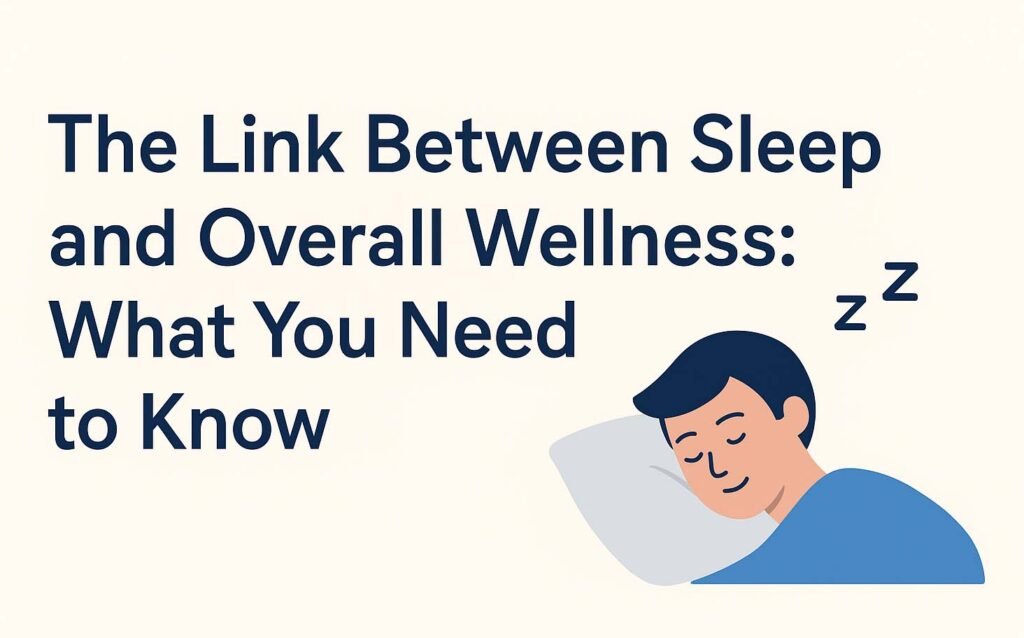
The Link Between Sleep and Overall Wellness: What You Need to Know
Why Sleep Isn’t Just “Rest”
The majority of us view sleep as the only thing going on is the body closing itself. However, the truth is opposite; the body is working to repair and rebalance while we are asleep, revitalizing. It is the foundation of our spiritual, emotional, and mental lives. Physically the following day, sleep is the lifeblood of people, just as diet and exercise are. It is the bedrock that keeps them standing strong.
Sleep and Your Mind: Reducing Disturbing Sounds
Have you noticed the overall feeling of weight loss after a bad night’s sleep? Changes in smells and noise are smaller, harder to keep focused, and moods can get shaken more easily. Sleep plays a direct role in mental health because it helps regulate emotions in the brain.
In point of fact, research has shown that when people get better sleep, people tend to get less stress, anxiety, etc. Frequently, depression decreases significantly. If not, we’re just giving you time to think, to take a break for the night, which makes the challenges of the day more manageable.
The Brain Boost: Sharper Thinking, Stronger Memory
Your brain is not idle while you sleep; it is busy organizing thoughts, getting rid of toxins, and making memories stronger. Imagine pressing “save” on the events of the day. Insufficient sleep slows reaction time, decision-making gets foggy, and memory recall weakens.
This explains why sleep-deprived people tend to feel like they are in mental quicksand. It gets worse as time goes on. Chronic sleep loss has even been linked to long-term cognitive decline, showing how much our brains depend on getting enough sleep at night.
Body Benefits: Healing from the Inside Out
Sleeping well not only helps to clear your mind, it also safeguards your body. Here’s how:
- Heart Health: Sleep helps keep your blood pressure in check and eases your cardiovascular system.
- Weight and Metabolism: Lack of sleep can alter hunger hormones, make it harder to resist cravings, and raise the risk of obesity and diabetes.
- Immunity Level: During deep sleep, the immune system produces infection-fighting cells. This means you’re not only less likely to get a cold—you may also respond better to vaccines.
- Repair of Cells and Hormone Balance: While you sleep, your body can release growth hormones that repair tissues and balance energy.
It goes without saying: while you sleep, your body is quietly battling illness, restoring balance to its systems, and strength.
Emotional Wellness: Waking Up on the Right Side
There’s a reason we say someone “woke up with the wrong side of the bed.” Sleep deprivation leads to reactions to stress, making it harder to cope and moods more fragile. On the other hand, consistent, good-quality rest builds emotional resilience—you’re more likely to respond positively and calmly to whatever the day throws at you.
What the Science Says About Sleep and Health
Researchers from all over the world increasingly demonstrate that getting enough sleep is not optional but a necessity. Some of the most notable results include:
- Better Sleep and Better Mental Health: A large study finds getting enough sleep means noticeable drops in levels of stress, anxiety, and depression.
- Shared Routes: Sleep is linked to mental and physical health, according to neuroscientific research. Health shares overlapping brain structures and even genetic connections.
- Sleep and Metabolism: One study looked at people who only slept four hours each night and developed impaired glucose regulation—similar to early stages of diabetes.
- Immunity Matters: Getting enough sleep may reduce risk of illness and improve responses to vaccines.
These findings highlight something simple and powerful: sleep is the body’s built-in medicine, which you can take for free each and every night.
Final Thoughts
For those who strive for better health, the message is clear: get as much sleep as you can and include movement. Rather than seeking perfection, focus on developing habits that respect the body you have been given. Whether that means putting off bedtime, reducing screen time before going to bed, or making your sleeping environment more comfortable—each small step brings you closer to better overall wellness.
